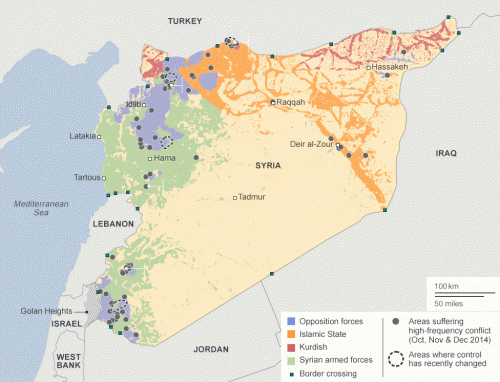Tide of war turning against Assad's Syria
The long 4-year civil war has had many ebbs and flows, but that can only go on for so long before one side collapses from exhaustion.
President Assad's time in power may be coming to an end.
The Islamic State is not the reason for the government's recent setbacks. Outside of the useless waste of manpower at Kobani, IS has not been able to mount of a serious offensive anywhere in Syria since last August. Their only real efforts have been in lightly populated regions facing little resistance, and the current siege of Deir Ezzor.
The so-called moderate rebel forces have been even less of a factor. They continue to lose what little ground they still retain, while squabbling amongst themselves.

The reason that Assad's government has returned to the brink has been the resurgence of Nusra Front.
After losing the capital of Idlib province in northwestern Syria this week, government forces on Thursday lost major ground in the south, where rebels captured the only functioning border crossing with Jordan, a crucial gateway for Syria's government.
For some observers, the successive losses represent a shift in Syria's four-year civil war — suggesting Assad's forces were overstretched and pointing to a new unity and assertiveness by opposition forces, which had long been plagued by divisions.
The opposition drive is being led largely by al-Qaida's branch in Syria, the Nusra Front. The group has long been among the strongest opposition forces, and in the recent moves it has shown greater coordination with other rebel factions. All told, the Nusra Front and its rival, the Islamic State group, now control roughly half of Syria, raising concerns about the country's future.
The takeover of the provincial capital of Idlib comes a few months after Nusra Front overran two government military bases in the same province, killing hundreds of soldiers in the process.
It's not a coincidence that Nusra Front and its close ally Ahrar al-Sham are both supported by Turkey and Qatar.
But nothing demonstrates the weakness of Assad's forces more than the near complete lack of a military response to Nusra's recent gains. In fact the only military response by Assad in northern Syria was a limited February offensive that quickly ended in disaster.
It's becoming increasingly obvious that Assad does not have the resources to retake even northern Syria, much less the broad expanse of eastern Syria.
Another development is the recent indications of political dissent in the elite.
While there are no indications yet that Mr. Assad plans to drop his hard-line strategy against the armed opposition, a recent flurry of reports of suspicious deaths and disappearances point to possible tensions developing within the regime.
If the trend of rebel successes continues – placing ever more pressure on an already exhausted and overstretched Syrian Army – those reported internal stresses might squeeze the regime into finally considering a negotiated settlement, some observers say.
...
Last month, Mohammed Assad, a relative of the president, was shot dead in the regime stronghold of Qardaha, reportedly over a dispute about money and influence. Last week, another Assad cousin, Monzer al-Assad, was arrested on the direct orders of the president for “illegal activities.” It remains unclear whether that alludes to common criminal practices or plotting against the regime.
Hafez Makhlouf, a cousin of the president and a key hardliner who headed the powerful General Security Directorate in Damascus, was reported last September to have been dismissed from his post, and later left the country for Belarus or Russia, where his father, Mohammed, lives. Official Syrian media said Mr. Makhlouf was subject to a routine personnel change to reflect a promotion.
Another incident that spurred intense speculation involves Rustom Ghazale, the head of Syrian political intelligence, who was alleged to have been badly beaten in February following a heated argument with Rafik Shehadeh, the head of military intelligence. The source of the argument is said to have been differences over Iran's increasingly influential role in helping prop up the Assad regime.
It's long been reported that desertions and defections have plagued the Syrian army, reducing its size by half. So many tens of thousands of soldiers have died that being enlisted is increasingly seen as death.

